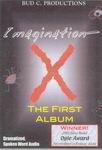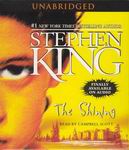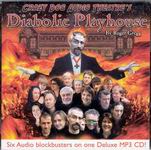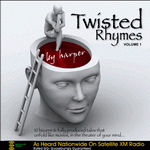
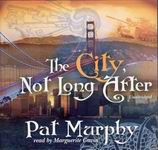 The City, Not Long After
The City, Not Long After
By Pat Murphy, read by Marguerite Gavin
7 CD’s – 8.5 hours [UNABRIDGED]
Publisher: Blackstone Audiobooks
Published: 2005
ISBN: 0786180862
Themes: / Science fiction / Fantasy / Magic realism / Post-apocalypse / Military / Pacifism / Art / Ghosts / War
At the root of all major religions is the simple, powerful assumption that every human being is capable of changing his character. With this premise, Nirvana, Salvation, and Enlightenment are opened to each of us, no matter what lies in our past. The logical extension beyond ourselves is that we are obliged to forgive our fellow man for his transgressions against us, because to do otherwise would deny him the possibility of redemption. Gandhi, Christ, and King have demonstrated that it takes a great deal of sacrifice and patience to follow this idea to its full conclusion, but the resulting justice for friend and foe alike cannot be won by anything less.
The vast bulk of our literature, however, belies our preference for punishing our enemies rather than enlightening them. Fantasy literature, in particular, usually frames central conflicts in terms of absolute good and evil, and shuns the possibility of change on either hand. Science fiction often simply avoids the issue by casting an inhuman force as the antagonist, such as a robot, an alien, or some crisis of scientific circumstance. But even so, these conflicts often favor a single-minded, unyielding approach to resolution, with a clear victor and a clear loser. This is especially true in the watered-down SF found in popular media.
Pat Murphy’s intriguing novel The City, Not Long After offers an exception to these rules, although it, too, flinches at the moment of truth. Apocalyptic fantasy is virtually defined by final clashes between good and evil, but Murphy’s post-apocalyptic tale pits peaceful artists against aggressive warriors in a future San Francisco that has been largely depopulated (along with the rest of the world) by a plague. The inhabitants of San Francisco are mostly bizarre artists, and they are struggling not only for their social freedom against an invasive force led by the militant General Nathan “Four Star” Miles, but for creative freedom against the incursions of a conformist society. In order to preserve their art and their free spirits, they make their resistance non-violent, and Pat Murphy takes the opportunity to make the resulting action interesting and original. In the course of it, she offers a clear-eyed examination of some darker elements from America’s past and present, and a scathing review of militant patriotism, both of which seem startlingly out of place in our current culture of eternal, chest-thumping war.
The best thing about this book is that, despite the description of its conflict above, it does not devolve into a moralistic sermon. In fact, the conflict which defines the plot takes up less than ten per cent of the novel. The rest of the time is spent developing the strange, arty, self-important characters who populate San Francisco. I’m not a big fan of characters (real or imagined) who go around proclaiming themselves artists, bemoaning society’s inability to recognize their gifts, and sculpting execrable statuary out of cold cream jars, but I ended up liking these people, especially Danny Boy and Jax, who provide the novel’s axis. They have real wounds and real tenderness that win out over their purposeful strangeness.
Marguerite Gavin’s narration was the perfect foil for these exotic, New Agey artists, for her voice is almost surgically precise and antiseptically clean. Her syllables are razor-edged for Jax and for the general narration, so the laid-back stoner voice she conjures for Danny Boy comes as a revelation. Gradually, I came to relate to almost all the voice characterizations, except for that of “Four Star”, who sounds more like a parody of a wicked military man than a real human being.
Thematically, I ultimately found the book to be a failure. The first problem is that our non-violent heroes require a discouragingly huge amount of supernatural help to stand a chance against bullets and bombs. The second is, to be vague enough not to spoil the book for you, that the climax is a cop-out. Murphy spends considerable time in the denouement trying to rub out this flaw, and she does succeed in provoking some thought, but nothing can cover the capitulation of the resolution.
That said, I still recommend this book. Murphy’s characters and situations are complex, vital, and often inspiring. It is far more interesting to watch her try and fail to deliver on her moral premise in this book than simply to wallow in the philosophical shallowness of summer-multiplex violent justice. At least The City Not Long After will make you both think and feel a little, and that is no small achievement.
Posted by Kurt Dietz

 Nightfall: The Room
Nightfall: The Room